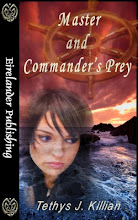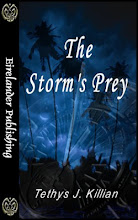Would you like to know how many writers run into the harsh edit? Uh, too many to count. There is a cold hard fact involved here, harsh edits fall into basically two categories – the one's where the author doesn't agree with the editor and the ones that are faulty.
I've received both. I didn't agree with some because after all I write the way I write. Here's another fact, just because some author in New York gets away with doing something doesn't mean you can follow suit. E-publishers for a long time have been fighting the original opinion that e-publishers will publish anything, sloppy or otherwise. Hell, there are times when I looked at some publishers and go to myself – can you say, Author Mill? For those of you who don't know what an author mill is, it is a quasi-publisher who either expects your story to be 'publication ready' or charges you for edits (if they offer that service at all). They'll slap cheap cover art on the story, assign it an ISBN number and there you go – welcome to being a published author.
Okay, so how do you tell the difference between a harsh edit and a faulty edit? If you've ever received a truly faulty edit you know. I once received an edit in which the person who edited it put in a scene break between each of my head hops. Rather than looking at the full scene as it stood. Having come across this before I knew what I had to do, but when I contacted the Editor-in-Chief to explain this was now a mass revision, I was told my editor was right and I had to abide by the edit. Here's a clue, try to remain professional. It doesn't help either side if someone starts to spout off. I came back with, do you really think adding 117 scene breaks to a 50,000 word story makes sense?
The other side of this is if you know you are struggling with a faulty edit; keep the ball in the editor or publisher's court. That means, keep your cool and stick to your guns. If you know what your editor is doing is wrong, then by all means advocate for yourself.
The other side is the harsh edit. I've received them and I have given them. The harsh edit comes in two forms (not surprisingly). The first is where the editor is reworking your story to make it better. The other is where you dig your feet in and start screaming 'no, no, no'. You need to keep in mind that if the edit is not faulty then you are expected to perform. Another important thing to understand is how editors edit. (This doesn't always happen, but this is the common process and the one at Eirelander Publishing).
- Global changes. This may come in the form of broad notes or bulk paragraph edits. Global changes include voice. POV switching. Loose Plot Lines. Stringing. Character name changes. Dropped plot points. They all fall under global changes.
- Refinement. The over usage of dialogue tags. Crutch words. Missing characterization or characterization falls off. Setting.
- Tweaking. This is the look when the editor is truly fine tuning the story. They are tweaking dialogue or getting you to delve a bit deeper into the emotional drive. Some editors address crutch words here. It makes little difference.
- Copy edit.
- Editor's final look.
- Errata. This is the author's final look.
Most editors do not jump straight to line edits. They'll tackle global changes first. Mostly because if they can't see the story through the weeds, what good does it do either themselves or the author. This is also helpful when you are revising your drafts.
The biggest thing to remember is if you don't agree with an edit it is best to discuss it with your editor. Don't get nasty, but do tell them you don't agree with them. If it is something such as POV you really don't have much of a choice since some publishers have policies against head hopping. If it's something minor or that really doesn't, in your opinion, change the scope of the story – then bring it up. Be prepared for them to say – this is the way that it is, and be open to their suggestions.
Sometimes you have to buck up and just do.
Your turn. Do you think the full edit process helps or hurts you. Have you ever received a faulty edit and not known what to do with it?
Until next week, cheers and happy writing,
T.J.





.jpg)
.jpg)






4 comments:
I've been lucky to be comfortable _enough_ with all of my editors but two. Suffice it to say the first taught me what is and isn't necessary in an edit. The second merely expressed a complete ineptitude and misunderstanding of fiction and romance writing on a whole. I've never dealt with either again.
I have had harsh edits. I have had harsh critiques. They are one and the same. To better the story. If a writer understands that necessity, neither are anithema.
I do agree with standing by your guns, professionally. It is your story. No one will know it better, but that doesn't mean it can't be made better for consumption. It's a team effort once it's contracted.
Thanks for stopping by, Diana. I know you know this deal. Great that you've found a happy home.
I haven't been published for long, so I've only had two editors. The first one mostly did line edits and possibly that was due to my great mentor. I didn't think she was a good editor as she wanted to change my action story to a passive one.
My second editor was definitely good. Even when I read it for the last time, I thought it was good, and I was really tired of it by then. lol
Good post, T.J. I'm still learning.
Thanks for stopping by, Sandy. I hear you about Addiction. Great story.
Post a Comment